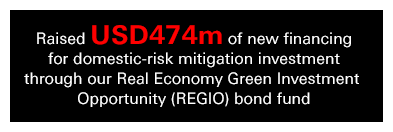Our commitment to ESG
We are delighted to have been awarded an ESG commitment level of “Advanced” by Morningstar.
Out of 140 strategies and 34 asset managers assessed by Morningstar only five asset managers earned a Morningstar ESG Commitment Level of Advanced. Morningstar defines advanced as those firms who are among the industry’s strongest ESG proponents and are deliberate in integrating ESG considerations into their investment processes using robust resources and formal monitoring.
The measure – which results in a score of Low, Basic, Advanced or Leader – was developed to “help investors discern funds and asset managers that truly focus on sustainable investing from those that incorporate ESG factors but in a limited way.”
| Why it matters: | How the team did it: |
|---|---|
|
The importance of ESG criteria continues to grow rapidly, but many investors feel confused about the claims they hear and it has become harder to separate funds and asset managers that truly focus on sustainable investing, according to Morningstar. The report says this rating makes us “among the industry’s strongest ESG proponents” who are “deliberate in integrating ESG considerations into their investment processes using robust resources and formal monitoring”. |
This supports the hard work that’s going into our Sustainable Investing strategy and evidences that we’re playing our part in helping to create a better world – for our clients, our people, our investors, our communities and the planet we all share. The rating is the result of close collaboration between teams across Asset Management, including the Responsible Investment & CIO teams, Sales, Consultant Relations and RFP team. |
Our philosophy
At HSBC Asset Management, we believe that Environmental, Social and Governance (ESG) issues can have a material effect on company fundamentals and performance over the longer term. Evaluating how companies manage their impact on the environment, their relationships with stakeholders, and their operations enables us to identify potential risks and opportunities which financial markets may not price appropriately.
Environment
• Greenhouse gas emissions • Resource depletion • Water use • Waste and pollution • Deforestation |
Social
• Regard for human rights • Development and treatment of staff • Oversight of supply chain • Health and safety of stakeholders • Regard for human rights |
Governance
• Executive pay • Business ethics and culture • Political lobbying and donations • Diversity and structure of board • Regard for shareholder rights |
In the last year, HSBC Asset Management has:





